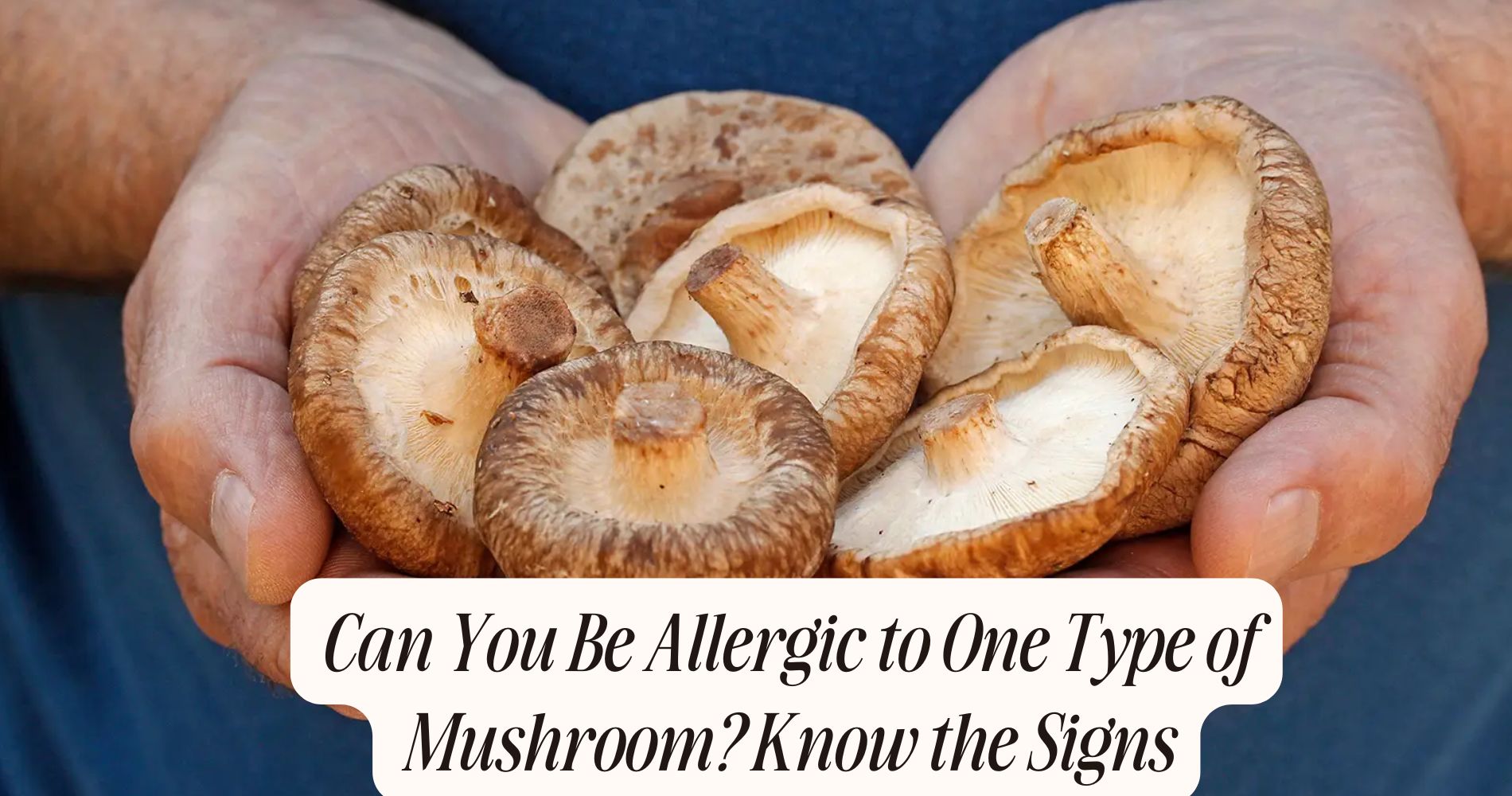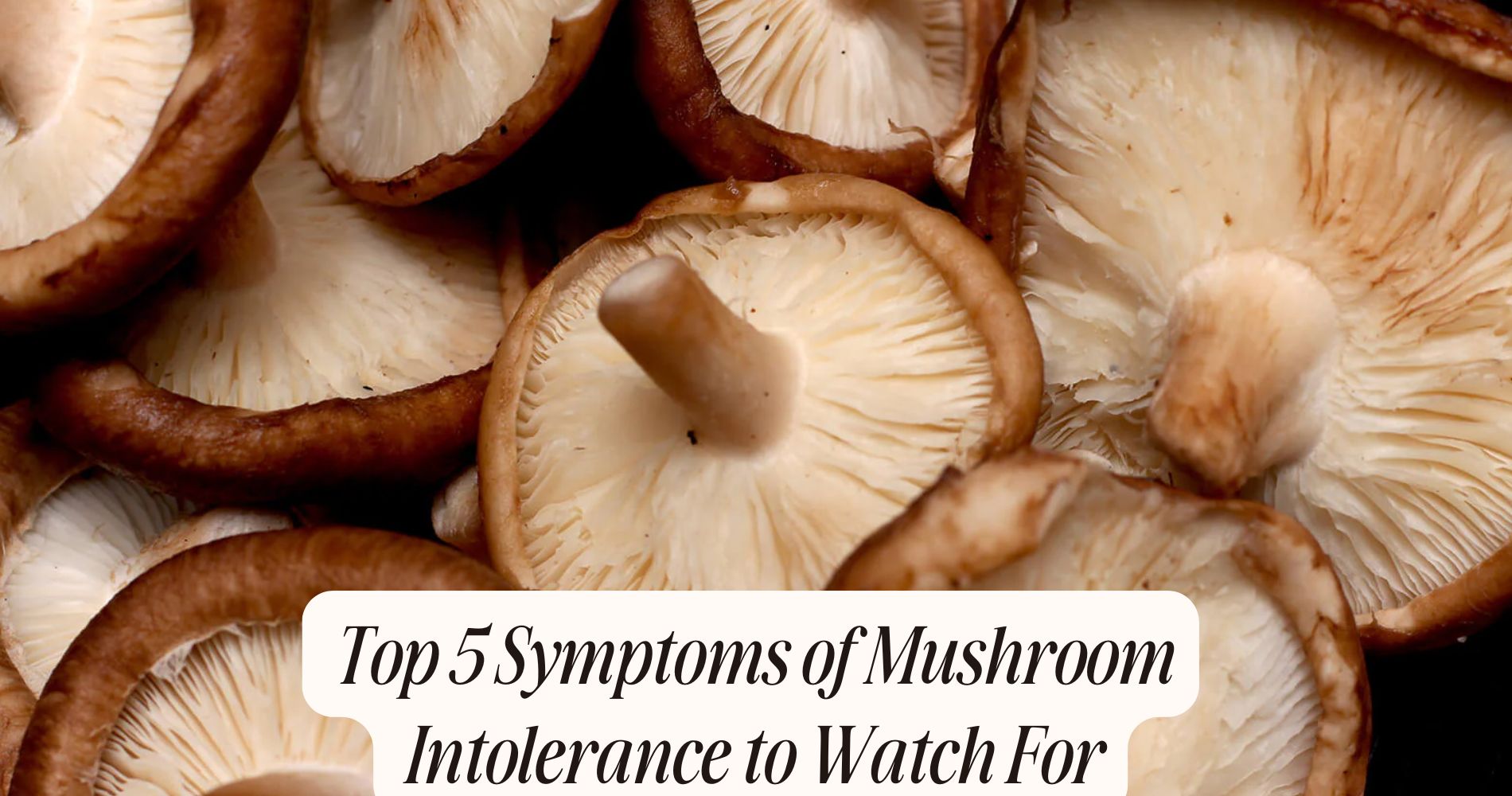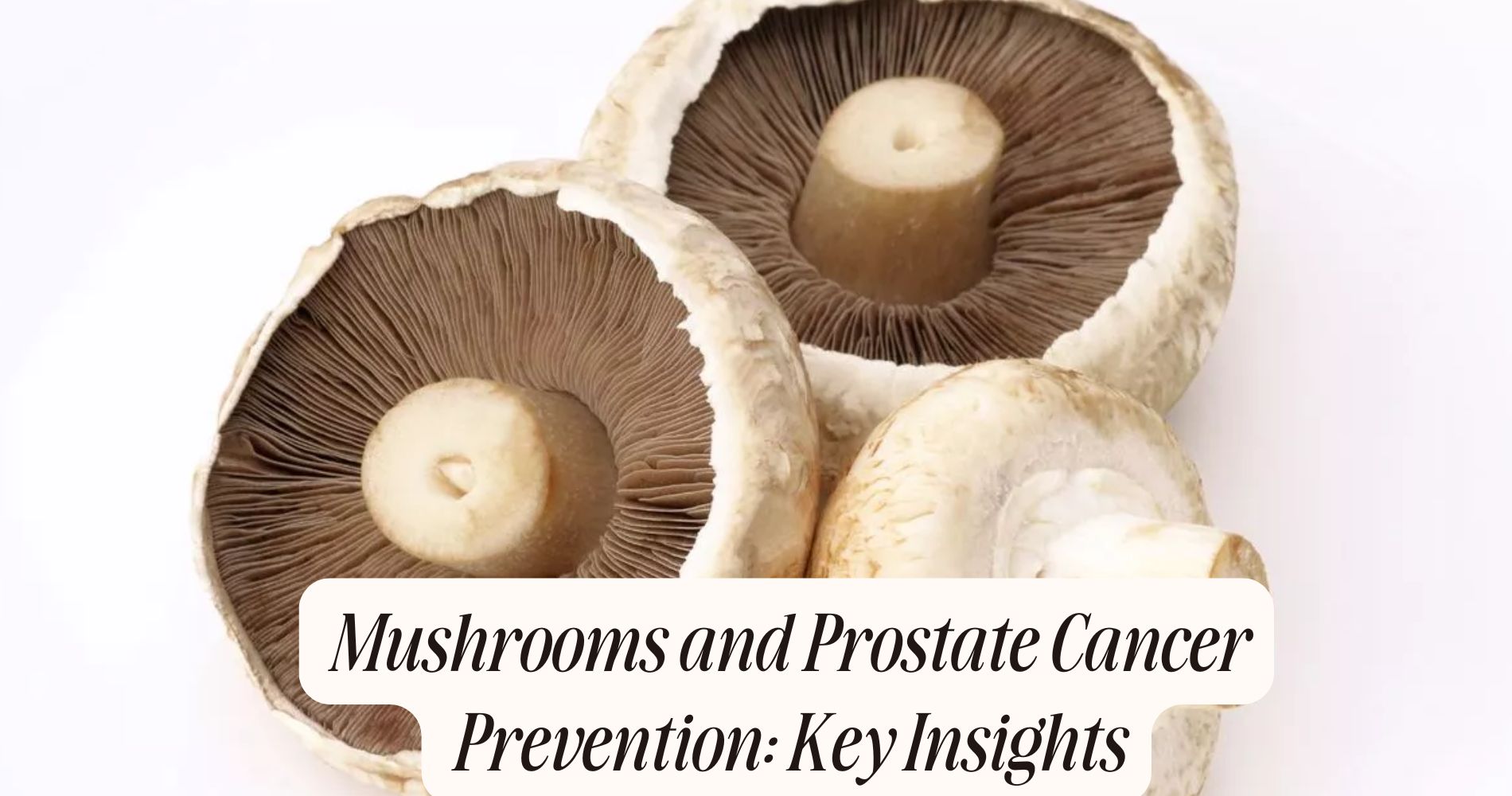
Can You Be Allergic to One Type of Mushroom? Know the Signs
Can you be allergic to one type of mushroom? Yes, you can be allergic to one type of mushroom due to your immune system reacting to specific proteins. This allergy often involves the production of Immunoglobulin E (IgE) antibodies, leading to symptoms like skin rashes, respiratory issues, or gastrointestinal disturbances. The severity of your reaction can depend on the type of mushroom and whether there's cross-reactivity with other species. Additionally, past allergy history plays an important role in identifying these allergens. To better understand your specific situation and effectively manage your reactions, it's important to consult healthcare professionals, especially if you suspect a mushroom allergy.
Understanding Mushroom Allergies
Mushroom allergies can manifest as a complex interplay of immune responses triggered by specific proteins found in various mushroom species. When you consume certain mushroom varieties, your immune system may mistakenly identify these proteins as harmful invaders, leading to an inappropriate immune response. This process often involves the production of Immunoglobulin E (IgE) antibodies, which play an essential role in mediating allergic reactions.
Different mushroom varieties contain distinct protein structures, and your sensitivity may vary depending on the specific type you ingest. For instance, some individuals may react to common edible mushrooms like Agaricus bisporus, while others may be more susceptible to wild varieties such as Amanita muscaria.
The immune response can also be influenced by genetic predispositions, environmental factors, and previous exposure to allergens.
Understanding the underlying mechanisms of mushroom allergies is significant for effective management. You should consider the specific mushroom proteins involved and assess your individual sensitivities.
Always consult a healthcare professional for personalized advice and potential testing to identify which mushroom varieties you should avoid. By recognizing these immune responses, you can take proactive steps to mitigate the risks associated with mushroom allergies.
Common Symptoms of Allergies
Allergic reactions can present a range of symptoms, varying in severity and type depending on individual sensitivities and the specific mushroom species involved. When you encounter an allergenic mushroom, your immune system may overreact, leading to immediate or delayed responses.
Common symptoms include skin reactions like hives or eczema, respiratory issues such as nasal congestion, sneezing, or asthma-like symptoms, and gastrointestinal disturbances, which might manifest as nausea, vomiting, or diarrhea.
It's vital to take into account cross-reactivity concerns, where proteins in one mushroom species might trigger reactions in individuals allergic to another species. This cross-reactivity can complicate diagnosis and management, as your sensitivity may extend beyond a single mushroom type.

Furthermore, environmental triggers, such as pollen or mold, may exacerbate your symptoms, particularly in sensitive individuals.
Understanding these common symptoms can help you identify potential allergic reactions early. If you suspect you have a mushroom allergy, consulting with a healthcare professional for proper testing and diagnosis is essential.
This proactive approach guarantees you can manage your symptoms effectively and reduce the risk of severe allergic reactions.
Specific Types of Allergic Reactions
When exposed to certain mushrooms, your immune system may react in specific ways, leading to various types of allergic responses. Different mushroom varieties can trigger distinct immunological reactions, primarily mediated by immunoglobulin E (IgE) antibodies.
For instance, you might experience immediate hypersensitivity reactions, such as urticaria or anaphylaxis, usually within minutes of consumption. This occurs when your immune system identifies specific proteins in the mushroom as harmful.
You may also encounter delayed-type hypersensitivity, where symptoms manifest hours or even days after exposure. This reaction is primarily T-cell mediated and can lead to skin eruptions or respiratory issues.
Some mushroom varieties contain mycotoxins, which can provoke toxic reactions rather than classical allergic responses, manifesting as gastrointestinal distress or neurological symptoms.
In cases of cross-reactivity, your body's immune system may mistakenly identify proteins in one mushroom as similar to those in another, leading to unexpected allergic symptoms.
Understanding the specific types of allergic responses related to different mushroom varieties enables you to identify and manage your allergies more effectively, minimizing exposure and preventing severe reactions.
Diagnosing Mushroom Allergies
When diagnosing a mushroom allergy, you'll need to recognize symptoms that may include skin rashes, gastrointestinal distress, or respiratory issues.
Various testing methods, such as skin prick tests or serum-specific IgE testing, can confirm the presence of an allergy.
Understanding these diagnostic tools is essential for effective management and avoidance of mushroom allergens.
Symptoms of Mushroom Allergy
Identifying the symptoms of a mushroom allergy is vital for timely diagnosis and management. Symptoms can vary considerably depending on the specific mushroom types involved and individual sensitivity. Common allergy triggers include proteins found in various mushrooms, which can provoke an immune response.
You might experience gastrointestinal symptoms such as nausea, vomiting, or diarrhea shortly after ingestion, reflecting the body's attempt to expel the allergen.
Cutaneous reactions are also prevalent, manifesting as hives, eczema, or generalized itching. These symptoms arise from histamine release due to the immune system's reaction to the allergenic proteins.

Respiratory issues, including nasal congestion, sneezing, or asthma-like symptoms, may occur upon exposure to airborne spores or during handling.
In severe cases, anaphylaxis is a major concern, characterized by difficulty breathing, swelling of the throat, and a rapid drop in blood pressure. Recognizing these symptoms promptly can be life-saving.
If you suspect a mushroom allergy, especially after consuming specific mushroom types, it's imperative to seek medical advice for further evaluation and management. Understanding these symptoms helps you navigate your dietary choices and avoid potential health risks effectively.
Testing Methods Available
To accurately diagnose a mushroom allergy, healthcare professionals employ a variety of testing methods that assess your immune response to specific fungal proteins.
One common approach is the skin prick test, where a small amount of mushroom extract is introduced into your skin to observe for reactive symptoms. Blood tests are another option, measuring the levels of specific IgE antibodies that indicate an allergic reaction.
Additionally, an elimination diet may be recommended, where you avoid suspected mushrooms to monitor symptom changes. Tracking your symptoms during this period helps establish a clearer allergy history.
For those with ambiguous results, patch testing can identify delayed hypersensitivity reactions to fungal proteins.
Cross-reactivity issues are vital to take into account; if you're allergic to one type of mushroom, you might react to others due to similar proteins. Documenting your allergy history and symptoms can guide the testing process effectively.
If diagnosed, potential immunotherapy options may be discussed with your healthcare provider, aimed at desensitizing your immune response to specific mushrooms.
These all-encompassing testing strategies guarantee an accurate diagnosis and tailored management plan for your mushroom allergy.
Foods to Avoid
Although mushrooms can be a nutritious addition to your diet, certain varieties pose significant risks for individuals with mushroom allergies. If you're allergic to one type of mushroom, it's vital to understand the potential for allergic cross reactivity among different mushroom varieties.
For example, if you're allergic to shiitake mushrooms, you might also react to other edible fungi like maitake or enoki due to shared protein structures.

In addition to avoiding specific mushroom varieties known to trigger your allergy, it's wise to steer clear of products that contain mushroom derivatives, such as mushroom powders, sauces, or extracts. These ingredients can often be hidden in processed foods, making it essential to read labels meticulously.
Furthermore, certain foods may exacerbate your sensitivity. For instance, wild mushrooms can be particularly risky because of their unpredictable allergens and potential for cross-contamination with cultivated varieties.
Testing for Allergies
Accurate testing for mushroom allergies is essential for anyone suspecting an adverse reaction to these fungi. The diagnostic process typically begins with a thorough allergy history, where you'll discuss any previous reactions to mushrooms or related environmental factors. This history is important for identifying potential allergens and understanding cross reactivity, as some individuals may react to multiple mushroom species.
Two common methods for allergy testing are skin prick tests and blood tests. Skin prick tests involve introducing small amounts of mushroom extracts into your skin to observe for any immediate allergic responses. Alternatively, blood tests measure specific IgE antibodies related to mushrooms, providing a broader view of your allergic profile.
Additionally, maintaining a symptom diary can be invaluable. Documenting your reactions, including timing and severity, can help you and your healthcare provider identify patterns and triggers. This approach allows for a more targeted and effective testing strategy.
Ultimately, proper testing is essential for accurate diagnosis and understanding your unique allergy profile, enabling informed decisions about mushroom consumption and potential risks.
Managing Allergic Reactions
Managing allergic reactions to mushrooms requires a proactive approach to minimize exposure and address symptoms swiftly. Understanding your specific mushroom allergy is essential for effective allergy management.
Begin by identifying and eliminating all potential sources of the allergen from your diet and environment. This includes reading food labels meticulously and communicating your allergy when dining out.
Reaction prevention is significant. Carry an epinephrine auto-injector if you've experienced severe reactions in the past. Familiarize yourself with the signs of anaphylaxis, such as difficulty breathing, swelling, or rapid heartbeat, and make sure friends and family know how to assist you in an emergency.
Regularly consult with a healthcare professional to stay updated on your allergy status, as sensitivities can evolve over time. Additionally, keep antihistamines readily available to manage mild reactions, such as hives or itching.
Educate yourself about cross-contamination risks, especially when preparing food. Be cautious with foraged mushrooms and confirm you're consuming only known safe varieties.
Seeking Professional Help
If you suspect you're experiencing allergic reactions to mushrooms, it's essential to consult an allergist for a thorough evaluation.
They can perform specific tests, such as skin prick or serum-specific IgE tests, to confirm the presence of mushroom allergies.
Early identification and professional guidance can help you effectively manage your condition and avoid potential severe reactions.
When to Consult Allergist
Mushroom allergies can trigger a range of symptoms, and recognizing when to seek the expertise of an allergist is fundamental for effective management. If you experience consistent or severe reactions after consuming mushrooms, it's imperative to consult an allergist. Symptoms such as hives, gastrointestinal distress, or respiratory issues may indicate an allergy, and understanding these allergy triggers is essential for your safety.
During the consultation process, the allergist will review your medical history and your reaction patterns to mushroom exposure. They may inquire about specific types of mushrooms you've encountered, as some individuals may only react to particular varieties. This detailed assessment helps determine the severity of your allergy and guides your treatment options.
Additionally, if you notice symptoms worsening or occurring with increased frequency, don't hesitate to reach out to an allergist. Early intervention can prevent more severe reactions and improve your quality of life.
Testing for Mushroom Allergies
After consulting with an allergist about your mushroom reactions, the next step often involves systematic testing to confirm the allergy. The allergist may recommend skin prick tests or specific IgE blood tests to identify your sensitivity to various mushroom varieties.
During a skin prick test, small amounts of mushroom extracts are applied to your skin. If you're allergic, you'll develop a localized reaction, indicating a positive result.

Blood tests measure specific IgE antibodies in response to different mushroom proteins, providing quantitative data on your sensitivity levels. It's important to note that allergy prevalence varies among different mushroom types, and cross-reactivity can occur between closely related species.
Consequently, accurate identification of the specific mushroom(s) triggering your reactions is vital.
In some cases, oral food challenges may be necessary, where you'll consume small amounts of the suspected mushroom under medical supervision. This method helps confirm the allergy but carries risks and should only be conducted in a controlled environment.
Ultimately, collaborating with your allergist will guide you through the testing process, ensuring a tailored approach to managing your mushroom allergies effectively.
A Safer Way to Enjoy Mushrooms: Well Gummies SUPER MUSHROOM GUMMIES
If you’re cautious about mushroom allergies but still want to benefit from their incredible properties, Well Gummies SUPER MUSHROOM GUMMIES are a smart choice. With ten carefully selected functional mushrooms in a vegan gum chew form, these gummies provide energy, focus, and immune support without the worry of triggering specific sensitivities.
Enjoy the delicious wild berry flavor and feel confident in your wellness journey. No jitters, no crashes—just a safe, convenient way to incorporate the power of mushrooms into your daily routine. Try Well Gummies today!
Frequently Asked Questions
Can Cooking Mushrooms Reduce Allergy Risks?
Cooking mushrooms can alter their protein structures, potentially reducing allergenic properties. Different mushroom preparation and cooking methods, like boiling or sautéing, may help minimize allergenic reactions, but individual responses vary considerably, necessitating careful observation.
Are Mushroom Allergies Hereditary?
Mushroom allergies can indeed have a hereditary component. If you experience mushroom allergy symptoms, seek mushroom allergy testing to identify specific allergens and determine if a family history influences your susceptibility to these reactions.
Can Mushroom Allergies Develop in Adulthood?
Yes, you can develop a mushroom allergy in adulthood. Symptoms like hives or gastrointestinal distress may arise after exposure. Adult allergy development often occurs due to changes in immune response, emphasizing the need for vigilance with new foods.
What Cross-Reactive Foods Should I Avoid?
To avoid cross-reactive fruits, steer clear of those with similar allergens, like peaches, plums, and cherries. These fruits often share proteins with mushrooms, potentially triggering an allergic response in sensitive individuals. Stay informed and cautious.
Can Mushroom Allergies Cause Anaphylaxis?
Yes, mushroom allergy symptoms can trigger anaphylaxis in sensitive individuals. Common anaphylaxis triggers include specific mushroom proteins, leading to severe reactions. Always monitor for symptoms and seek emergency care if you suspect anaphylactic response.
Conclusion
To summarize, you can indeed be allergic to specific types of mushrooms, exhibiting a range of symptoms from mild to severe. Recognizing these signs is vital for effective management. If you suspect a mushroom allergy, it's important to consult with a healthcare professional for accurate diagnosis and tailored advice. By identifying trigger mushrooms and avoiding them, you can mitigate risks and maintain your health. Stay vigilant and informed to navigate your food choices safely.




